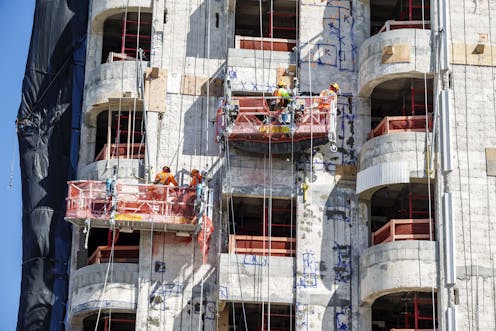Florida’s new condo laws recognize the total price of living on the beach
- Written by Bill Hughes, Research Director, Kelley A. Bergstrom Real Estate Center, University of Florida

Nearly a million Florida condo owners face an important deadline at the end of the year. That’s when a law passed in 2022 requires most Florida condo associations[1] to submit inspection reports for their buildings and to collect money from owners to pay for any needed repairs.
Condo owners are reporting that new condominium rules are driving up fees[2] and inducing outrageous assessments.
The media has picked up on the outrage. News articles about condo owners “facing financial turmoil as a result of new building safety regulations[3]” and how “bills are crippling homeowners[4]” lead readers to believe that Florida lawmakers have imposed an egregious tax on the elderly and those on fixed incomes.
This is misleading at best.
As the research director at the University of Florida’s Bergstrom Real Estate Center[5], I suggest it is important to set emotions aside and see what these laws attempt to accomplish.
Safety inspections
The 2022 state condo law, known as SB-4D[6], and its 2023 follow-up, SB-154[7], establish three primary requirements: licensed inspections, reporting and disclosures, and reserve funds.
Importantly, these laws are not tax legislation that directly increases housing costs on condo owners.
But by requiring more inspections, transparency and funding to cover repairs, many owners will face costs much greater than the amounts paid in the past. These new expenses simply reflect more of the true cost of living in a condo near the ocean.
Under the laws, all buildings occupied before 1992 must complete a milestone inspection by Dec. 31, 2024. This is an examination of the building’s structural integrity by an architect or engineer.
The requirement also applies to buildings at least 25 years old that are within 3 miles of the coast.
If the milestone inspection finds a potential structural problem, testing is required to determine if structural repairs are needed. If they are, owners must fund these repairs without an option to waive by vote.
If no damage is identified, then the association must report and post the results, and that concludes the requirement.
Prior to SB-4D, milestone inspections were not required outside of Miami-Dade[8] and Broward counties[9]. Now, they are required statewide and must be reported to local authorities, all unit owners and the public for buyer information.
Adequate savings for repairs
The new regulations also require building associations to budget and collect sufficient reserves to cover the cost of maintaining and replacing parts of their buildings subject to regular wear and tear, such as roofs, elevators and balconies.
History suggests that most homeowners associations struggle to adequately save for repairs and maintenance to keep their properties safe and in top condition.
“Florida has … more associations that are considered weak [in terms of funded reserves] than any other state,” Will Simons, the head of Florida and Southeast Operations at Association Reserves[10], which conducts reserve studies for condo and community associations, told a colleague[11] as part of a research article.
The Champlain Towers South condominium that collapsed in the Miami suburb of Surfside in June 2021, killing 98 people[12], is just one example. Simons’ company completed a reserve study of the condo just months prior to the collapse and found its association was significantly underfunded.
The association held approximately US$706,000 in reserves[13] as of January 2021. Association Reserves recommended the association stockpile nearly $10.3 million to account for necessary repairs. That means the Surfside condo’s homeowners association had just 6.9% of the money it needed on hand.
True costs of living by the ocean
More than 16,000 condominium associations representing over 900,000 of Florida’s 1.5 million condominium units are currently affected by the new laws because these units are already more than 30 years old.
Properties that have been sufficiently maintained and hold adequate reserves for future structural repairs will face nothing but an increased disclosure of inspection reports and continued reserve funding.
Many residents, especially retired seniors, are struggling to adapt to the funding requirement. In response, Gov. Ron DeSantis is indicating some form of relief[14] for owners facing financial hardship over these regulations.
Frustration is understandable, as current residents are asked to simultaneously fund 30 years of past deterioration and also set aside savings for the next 30 years. However, policymakers are simply setting guidelines that condo owners should have established for themselves. Properties that face significant financial shocks from SB-4D are, by definition, undermaintained or underfunded.
It is important to separate the intent of these laws from possible overreaction or fraud from condo associations, which is an existing concern. House Bill 1021[15], signed into law in June 2024, focuses on association governance to manage oversight of this type.
Oceanside concrete structures, roofs, windows and elevators have limited lifespans. These items need to be repaired or replaced to protect residents’ safety. The new regulations are making the true condo costs transparent to unit owners and buyers.
References
- ^ requires most Florida condo associations (www.flsenate.gov)
- ^ driving up fees (www.msn.com)
- ^ facing financial turmoil as a result of new building safety regulations (www.tampabay.com)
- ^ bills are crippling homeowners (www.nytimes.com)
- ^ Bergstrom Real Estate Center (warrington.ufl.edu)
- ^ SB-4D (www.flsenate.gov)
- ^ SB-154 (www.flsenate.gov)
- ^ Miami-Dade (miamidade.elaws.us)
- ^ Broward counties (www.broward.org)
- ^ Association Reserves (www.reservestudy.com)
- ^ told a colleague (warrington.ufl.edu)
- ^ killing 98 people (www.cbsnews.com)
- ^ US$706,000 in reserves (www.cnn.com)
- ^ Gov. Ron DeSantis is indicating some form of relief (www.tampabay.com)
- ^ House Bill 1021 (www.flsenate.gov)







